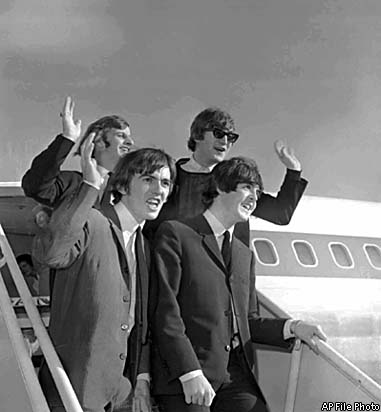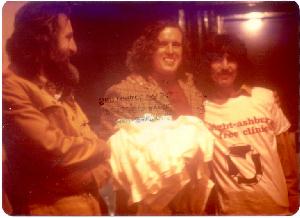 http://www.sfgate.com/
Harrison had love-Haight relationship with S.F.
http://www.sfgate.com/
Harrison had love-Haight relationship with S.F.
Former Beatle bolstered Free Clinic, but found hippies 'hideous'
Ben Fong-Torres, Special to The
Chronicle
Sunday, December 2,
2001
©2002 San
Francisco Chronicle
URL: http://www.sfgate.com/cgi-bin/article.cgi?f=/chronicle/archive/2001/12/02/MN235869.DTL&type=news

It would be a stretch to say that George Harrison ever left his heart in
San Francisco.
But the last time he was in the Bay Area, on a tour I covered for Rolling
Stone magazine, he left a lot of much-needed money and single-handedly kept a
major part of the Haight-Ashbury Free Clinic afloat.
Harrison played in the Bay Area three times as a Beatle and once by
himself.
When the Beatles first performed in the city (or just across a border, in
Daly City, at the Cow Palace) in August 1964, their appearance marked the
first of the Fab Four's first full tour of the United States and Canada.
A year later, again in August, again at the Cow Palace, they performed the
last show of a brief, two-week tour, begun just after the release of their
second film, "Help!"
And then, on Aug. 29, 1966, they played Candlestick Park, not knowing that
they were performing their last paid concert. (Their rooftop romp at Abbey
Road Studios in London in 1969 was a freebie, filmed for the documentary that
would be titled "Let It Be.")

KNOWING HOW TO STAND OUT
Although I was a certifiable Beatlemaniac -- even had every song on "Rubber
Soul" memorized -- I didn't see the band live until that summer evening at
Candlestick Park. I vividly remember Harrison as the man in white. Socks, that
is. I remember the sonic blur of their music -- they played, as Paul McCartney
once told me, at double-speed and couldn't hear themselves above the teenaged
din. I recall telephoning a college buddy at home, so that he could at least
hear some of the din. But most of all, I remember George's white socks. He may
have been the "quiet Beatle," but he knew how to stand out.
As shy and reclusive as he was said to be, he stood out again when he came
back to San Francisco on Aug. 8, 1967, and visited the Haight. He and his
wife,
Patti Boyd, had traveled from England to Los Angeles the week before,
renting a house on Blue Jay Way, which gave Harrison an idea for the tune of
the same name. He'd helped promote, and attended, a concert by Ravi Shankar,
the Indian composer and sitar player, in Hollywood.
LEADING A CROWD IN THE HAIGHT
Now, in San Francisco, he told reporters that he was simply curious about
the hippie phenomenon. George, then 24, Patti, and Beatles press agent Derek
Taylor drove into the area in the early evening and strolled, unnoticed, along
Haight Street. They reached the sector of Golden Gate Park then known as
"Hippie Hill," where they found a young man performing before a gathering of
about 20 longhaired youths. After a few minutes, Harrison asked to borrow the
musician's guitar, and proceeded to play. A few more minutes later, one young
woman finally recognized him.
"Hey," she shouted. "That's George Harrison. That's George Harrison!"
David Swanston, a Chronicle reporter on the scene, noted what happened
next:
"As the cry echoed through the park, hippies clambered down hills, dropped
from trees and sprang from behind bushes. A sizable crowd formed.
"Harrison played for about 10 more minutes and then shouted, 'Let's go for
a walk.'
" 'Yeah,' shouted the hippies, 'let's go.'
"And off they went. Harrison strumming the guitar, the hippies following
along. As the crowd left the park and moved down Haight, it grew. And grew.
"As Harrison strolled and strummed, hippies bubbled up beside him and posed
questions:
" 'How does it feel to have the family all together?' one asked.
" 'It's gettin' better all the time,' Harrison responded.
" 'What do ya think of the Haight-Ashbury?' another queried.
" 'Wow, if it's all like this, it's too much,' Harrison answered."
'HIDEOUS, SPOTTY' TEENS
But that's not what he told others. In "Dark Horse," a Harrison biography,
author Geoffrey Giuliano quotes him saying that he'd thought the Haight "would
be something like King's Road (in London), only more. Somehow I expected them
to all own their own little shops. I expected them all to be nice and clean
and friendly and happy."
Instead, he said, he found the hippies "hideous, spotty little teenagers."
(Giuliano also described Harrison as being too stoned to play, offending the
crowd by returning the guitar without singing, and being chased back to his
limo by a "wild band of jeering hippies.")
But Harrison didn't forget the Haight.
In 1971, riding high on his triumphant debut solo effort, the three-record
"All Things Must Pass," which included the No. 1 hit, "My Sweet Lord," he
helped stage and hosted an all-star rock benefit to raise money for starving
children in Bangladesh. Harrison was now a devotee of Indian music and Eastern
spiritualism.
MUTED RECEPTION IN '74
Before his 1974 tour, he had decided that several concerts would be
benefits, and he had heard about the plight of the Haight-Ashbury Free Clinic.
The Free Clinic opened in 1967, the year of Harrison's first visit, and had
survived the district's post-Summer-of-Love speed/rip-off/deterioration phase.
The clinic had grown but had lost federal revenue-sharing money marked for
1975. It was set to shut down part of its medical sector, which, the previous
year, spent $67,500 to treat 10,000 patients. Harrison donated net profits
from his first Bay Area concert to the clinic -- a total of $66,000.
The day after that first concert, Harrison, future wife Olivia Arias, who
was at that time working for his record label, Dark Horse, and several others
visited the clinic. This time, he was no pied piper leading an adoring mass.
Patients at the clinic recognized him. But, as founder Dr. David E. Smith
said,
"Nobody gaped; nobody mobbed him or kissed his ass."
Harrison toured the clinic and chatted with several staff members.
"He said he hoped to start a ripple with other musicians doing the same
kind of things," writer Amie Hill, a clinic volunteer, reported. "The doctors
gave him a plaque, and someone told me he said, 'Don't thank me. It's not me,
it's something else over us that acts through people like me. I'm just an
instrument.' "
And as he spoke, he broke into one of his songs, "The Lord Loves the One."
On his tour, which began in Vancouver and Seattle, then headed into San
Francisco and Oakland, he pointedly disavowed his Beatle past at the risk of
upsetting his fans. He wanted his fans to listen to Shankar's music, and gave
a large portion of the concert over to Shankar's Indian orchestra. When he
deigned to perform Beatles songs or hits of his own, he changed lyrics, so
that it was "In my life, I love God more," and his guitar no longer gently
wept, but smiled. He sang those lyrics in a voice strained by overuse during
rehearsals. As it turned out, the protests came not only from newspaper
critics, but from his inner circle, and from some fans as well.
I covered the beginning of the tour for Rolling Stone magazine, and after
the Bay Area shows, we met between concerts at the Forum in Los Angeles,
where,
backed by Olivia and several others, he stoutly and stubbornly held his
ground against the criticism. I asked what he had to say to those fans who'd
paid $9.50 -- then a top price for a concert ticket -- and wanted at least a
taste of Beatle George.
Harrison leaned forward: "Well, why do they want to see if there is a
Beatle George? I don't say I'm Beatle George."
"Well, one of the things you don't control . . ."
"I do control . . ."
". . . is how the audience feels about you. The conceptions . . ."
"OK, but I certainly am going to control my own concept of me. Gandhi says
create and preserve the image of your choice. The image of my choice is not
Beatle George. If they want to do that they can go and see Wings."
MAKING POINTS WITH HUMOR
At a pretour press conference. Harrison had opened with an odd statement:
"I really didn't want to do this for a living. I've always wanted to be a
lumberjack." When I asked what he meant by that, I got a dose of the humor
that, like his musicianship, was noted all too little.
"What I mean," he said, "is like Billy Preston says, 'I ain't tryin' to be
your hero.' But I'm just a lumberjack." Softly, Harrison began to sing Monty
Python and His Flying Circus' ludicrous and lusty anthem about the joys of
being a lumberjack. But as the laughter in the room subsided, it was clear
that Harrison had a serious point to make.
"I'd rather try and uphold something that I believe in than destroy
something I don't believe in. Because it's a waste of time."
In the end, he said, "My life belongs to me." He quickly corrected himself.
"It actually doesn't. It belongs to him. My life belongs to the Lord Krishna,
and there's me dog collar to prove it. I'm just a dog and I'm led around by me
collar by Krishna. . . . I'm the servant of the servant of the servant of the
servant of the servant of Krishna. I'm just a groveling lumberjack lucky to be
a grain of dirt in creation. That's how I feel. Never been so humble in all my
life, and I feel great."
I believe that he truly did. No matter how he sounded, and no matter the
poor reception he had received. And no matter that the article I wrote about
the tour drew the most negative mail in my dozen years at Rolling Stone
magazine. He was a happy grain of dirt, and I was happy for his happiness.
We had both come a long way since I saw him at Candlestick, and found
myself so taken by his white socks.
Ben Fong-Torres, a former Chronicle reporter, is vice president of content at
Collabrys Inc. and a curator for the Rock and cq Roll Hall of Fame and
Museum's library and archives. His book ""The Hits Just Keep on Coming: The
History of Top 40 Radio'' is being reissued in paperback this month by
Backbeat Books.
Ben Fong-Torres, a former Chronicle reporter, is vice president of
content at Collabrys Inc. and a curator for the Rock and @cq Roll Hall of Fame
and Museum's library and archives. His book "The Hits Just Keep on Coming: The
History of Top 40 Radio" is be
©2002 San Francisco
Chronicle Page A - 1